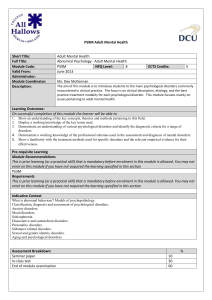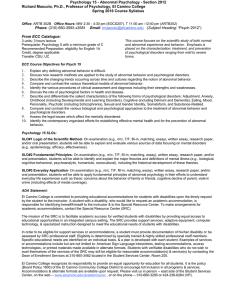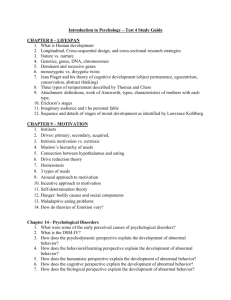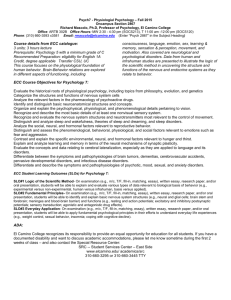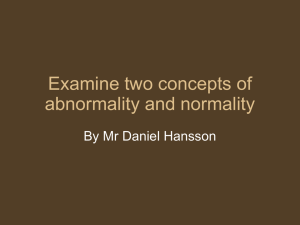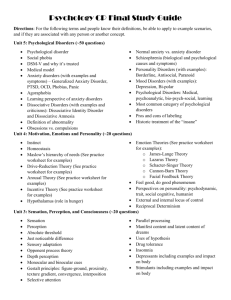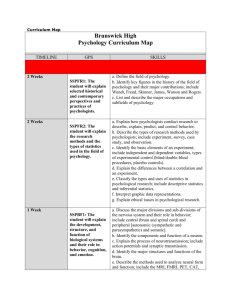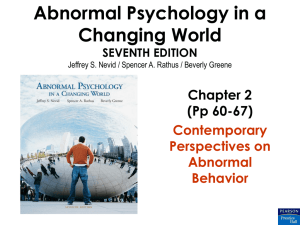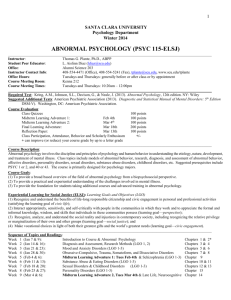Psychology 15 - Abnormal Psychology
advertisement
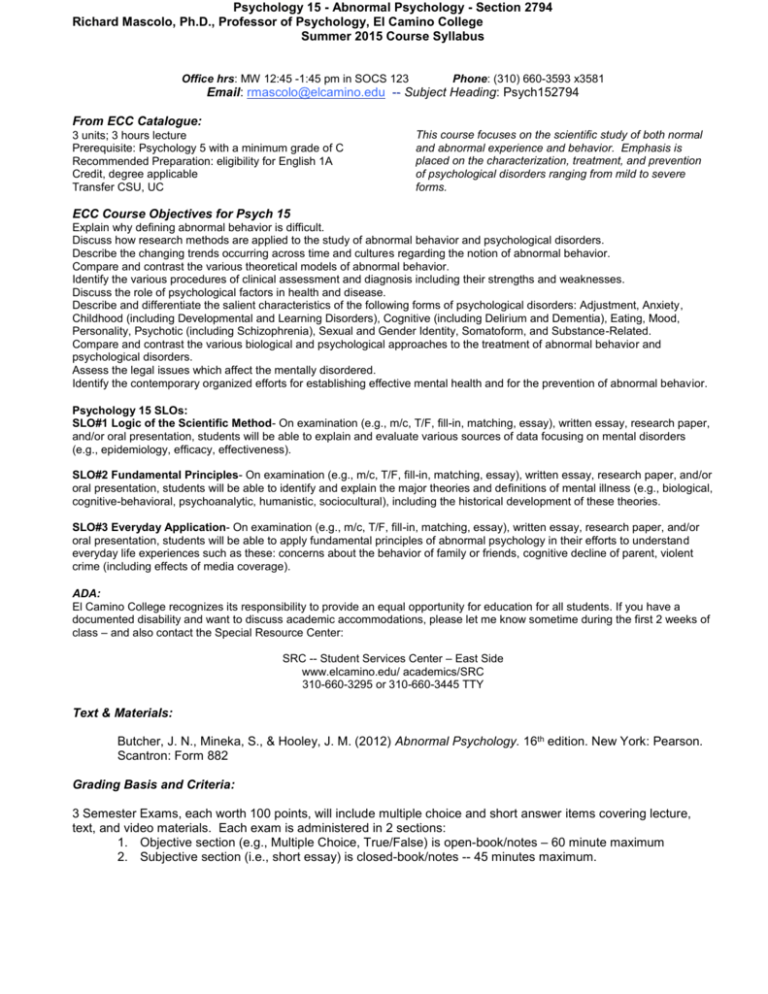
Psychology 15 - Abnormal Psychology - Section 2794 Richard Mascolo, Ph.D., Professor of Psychology, El Camino College Summer 2015 Course Syllabus Office hrs: MW 12:45 -1:45 pm in SOCS 123 Phone: (310) 660-3593 x3581 Email: rmascolo@elcamino.edu -- Subject Heading: Psych152794 From ECC Catalogue: 3 units; 3 hours lecture Prerequisite: Psychology 5 with a minimum grade of C Recommended Preparation: eligibility for English 1A Credit, degree applicable Transfer CSU, UC This course focuses on the scientific study of both normal and abnormal experience and behavior. Emphasis is placed on the characterization, treatment, and prevention of psychological disorders ranging from mild to severe forms. ECC Course Objectives for Psych 15 Explain why defining abnormal behavior is difficult. Discuss how research methods are applied to the study of abnormal behavior and psychological disorders. Describe the changing trends occurring across time and cultures regarding the notion of abnormal behavior. Compare and contrast the various theoretical models of abnormal behavior. Identify the various procedures of clinical assessment and diagnosis including their strengths and weaknesses. Discuss the role of psychological factors in health and disease. Describe and differentiate the salient characteristics of the following forms of psychological disorders: Adjustment, Anxiety, Childhood (including Developmental and Learning Disorders), Cognitive (including Delirium and Dementia), Eating, Mood, Personality, Psychotic (including Schizophrenia), Sexual and Gender Identity, Somatoform, and Substance-Related. Compare and contrast the various biological and psychological approaches to the treatment of abnormal behavior and psychological disorders. Assess the legal issues which affect the mentally disordered. Identify the contemporary organized efforts for establishing effective mental health and for the prevention of abnormal behavior. Psychology 15 SLOs: SLO#1 Logic of the Scientific Method- On examination (e.g., m/c, T/F, fill-in, matching, essay), written essay, research paper, and/or oral presentation, students will be able to explain and evaluate various sources of data focusing on mental disorders (e.g., epidemiology, efficacy, effectiveness). SLO#2 Fundamental Principles- On examination (e.g., m/c, T/F, fill-in, matching, essay), written essay, research paper, and/or oral presentation, students will be able to identify and explain the major theories and definitions of mental illness (e.g., biological, cognitive-behavioral, psychoanalytic, humanistic, sociocultural), including the historical development of these theories. SLO#3 Everyday Application- On examination (e.g., m/c, T/F, fill-in, matching, essay), written essay, research paper, and/or oral presentation, students will be able to apply fundamental principles of abnormal psychology in their efforts to understand everyday life experiences such as these: concerns about the behavior of family or friends, cognitive decline of parent, violent crime (including effects of media coverage). ADA: El Camino College recognizes its responsibility to provide an equal opportunity for education for all students. If you have a documented disability and want to discuss academic accommodations, please let me know sometime during the first 2 weeks of class – and also contact the Special Resource Center: SRC -- Student Services Center – East Side www.elcamino.edu/ academics/SRC 310-660-3295 or 310-660-3445 TTY Text & Materials: Butcher, J. N., Mineka, S., & Hooley, J. M. (2012) Abnormal Psychology. 16th edition. New York: Pearson. Scantron: Form 882 Grading Basis and Criteria: 3 Semester Exams, each worth 100 points, will include multiple choice and short answer items covering lecture, text, and video materials. Each exam is administered in 2 sections: 1. Objective section (e.g., Multiple Choice, True/False) is open-book/notes – 60 minute maximum 2. Subjective section (i.e., short essay) is closed-book/notes -- 45 minutes maximum. Total number of points for the semester is 300. Students earn their grades by accumulating points on Section Exams according to the following scale: POINT RANGE 269--300 239--268 209--238 194--208 0--193 GRADE A B C D F Course Schedule: WEEK TOPIC/CHAPTER TITLE CH READING 1 Intro: Hx of Science & Psych; Abnormal Psych: An Overview Historical and Contemporary Views of Abnormal Behavior 1 2 2 Causal Factors & Viewpoints Clinical Assess & Diagnosis 3 4 SECTION EXAM 1: MONDAY, JUNE 8 3 Panic, Anxiety, Obsessions, & Their Disorders Stress & Physical & Mental Health (PTSD material only) 6 5 4 Mood Disorders & Suicide Schizophrenia & Other Psychotic Disorders 7 13 SECTION EXAM 2: MONDAY, JUNE 22 5 6 Sexual Variants, Abuse, & Dysfunction (Sociocultural Influences, Gender Identity Disorders only) Personality Disorders Disorders of Childhood & Adolescence – Neurodevelopmental Disorders (ADHD, ODD, CD, & Autism only) Neurocognitive Disorders Contemporary & Legal Issues in Abnormal Psychology 12 10 15 14 17 SECTION EXAM 3: THURSDAY, JULY 2 Course Policies: 1. This course will cover such topics as alcoholism, sexuality, evolution, intelligence, ethnicity, & religion. By registering for & remaining in this course, students are agreeing to treat these issues in a manner that respects viewpoints differing from their own. 2. Cell phone use is not allowed in class. 3. No one is permitted to make video/audio recordings or take photographs during class or office hours. 4. Students who do not participate (miss Exams) or who are disruptive (e.g., violate Course Policies 1, 2, or 3 above or ECC Policies below) may be dropped from the class by the professor. 5. Exam dates are listed above--assume all announced exam dates are valid unless notified otherwise by the professor. 6. Students are responsible for keeping abreast of course announcements, including any changes in exam schedule or material. 7. Study guides are not provided; instead, students are expected to attend lectures in an active, purposeful way – thorough, thoughtful note taking in class will provide students with their own study guide. 8. Course grades are determined solely by the 3 Section Exam grades. Extra credit points are included in these Exams – there are no other sources of extra credit points in the course. 9. An “Incomplete” Grade may be assigned when an unforeseen emergency prevents a student from completing course requirements. The general understanding is that an Incomplete is appropriate when a substantial amount of course requirements was completed before or since a true emergency, but ECC defers this determination to the instructor. My policy for this course is that an Incomplete may be assigned only if the student missed either the Midterm or the Final, but not both. 10. Students should independently confirm these important dates: Monday, June 1, 2015 is the last day to: 1) add full semester courses, 2) challenge residency status for current semester 3) drop for an enrollment fee refund (full semester classes); 3) drop without notation on permanent record. Tuesday, June 23, 2015 is the last day to drop with a “W”. ECC Policies: Students who enroll in class but do not attend the first scheduled class meeting may be dropped from the roster & their places given to waiting students who were unable to enroll at the time of registration. If illness or emergency prevents a student from attending the first class session, the student must contact the instructor. A student who registers for a class & never attends is still responsible for dropping the class. Failure to properly drop a class may result in a “W” & may subject the student for any & all fees associated with the class. Students will not be permitted to attend classes in which they are not enrolled. Exceptions may be allowed by the instructor for bonafide visitors. Students who attend a class without proper enrollment (the student did not properly register or add the class) by the published deadline will not be permitted to “late add” the class except for documented extenuating & mitigating circumstances. Students are expected to attend their classes regularly. Students who miss the first class meeting or who are not in regular attendance during the add period for the class may be dropped by the instructor. Students whose absences from a class exceed 10% of the scheduled class meeting time may be dropped by the instructor. However, students are responsible for dropping a class within the deadlines published in the class schedule. Students who stop attending but do not drop may still be retained on the course roster & receive a failing grade. Students may view their registration status on MyECC. If space is available, students who have completed registration may add a class by going to the first meeting of the class & securing permission of the instructor. It is the responsibility of the student to fulfill all requirements to add a course, & to add the course by the add deadline in accordance with college procedures. Adds will not be processed beyond the add deadline. Official withdrawal from class must be processed through the online system in the Admissions Office. Failure to complete this process may result in the assignment of a letter grade of A through F. It is the responsibility of the student to officially drop a class by the deadline date. Student Code of Conduct: http://www.elcamino.edu/administration/board/boarddocs/5500 Academic Honesty.pdf Student Rights & Grievances Procedure 5530: http://www.elcamino.edu/administration/board/policies.asp Succeeding in this Course: Do the math: the California Community Colleges Guidelines for Title 5 Regulations, Chapter 6, Part 1 sets standards for the amount of work (measured in hours) per unit of college credit: For each hour of lecture, it is assumed that students will be required to spend an additional two hours of study outside of class. This course is 3 units, so the regulation requires 3 Lecture Hours & 6 Study Hours per week. How should this time be spent? Reading and Studying the assigned textbook material & my lecture notes. Notice I say Reading AND Studying. It is not enough simply to read the material—or even to read and reread the material. That is, passively taking in the authors’ words will not make the material available to you during an exam—or later in life. If you are experienced in succeeding in college courses, you know that you must work actively with the material you are required to learn. Maybe you’ve heard of the SQ3R (now the SQ4R to some), which is one system of study that promotes this approach of “active studying.” The essential feature boils down to working with the material in an active way so that you not only remember it but you can think critically about it -- like questioning explanations & conclusions, playing “Devil’s Advocate”, thinking up personal examples.... O.K., look at this issue more pragmatically (and immediately)—actively studying is the best way to pass exams. Again, it is not enough simply to read or even read and reread the material. For most of us, just plowing through chapter after chapter won’t do it. Myself – I’m not a strong reader -- I read one section of a chapter and then I stop – I think about what kind of questions I could be asked — what parts are easy for me? What parts are confusing? I ask myself, “What’s the upshot of this section? Could I explain it to someone else? Lastly, I want to emphasize that you are responsible for your success in this course. If you are a student who simply must have an A in this course, then your magic number is 90% – the minimum percentage needed for an A. If you’re satisfied just passing with a C, then the percentage you have to hit is 70%. My point is that you earn your grade – I don’t give it to you. Remember, there is no last-minute, end of the semester extra credit assignment that I will invent to save those who have only then realized they have not been scoring the points they need for the grade they want.
